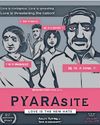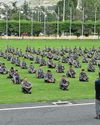
Vishwanath, a soft-spoken, sober young man, surprised everyone when he plunged into the student union elections at J.G. College of Commerce in Hubballi, Karnataka. His opponent was politically well connected and mobilised loud rallies on campus. Vishwanath quietly met his electorate and won. He then extended the olive branch to his opponent and became even more popular.
Thirty years later, Hubballi woke up to the news of the Cyberabad Police shooting dead the four accused in the gang-rape and murder of Disha, a 26-year-old veterinarian, in Hyderabad. As television channels flashed the images of Cyberabad Police commissioner Vishwanath Channappa Sajjanar (51), who headed the team that shot down the accused, Hubballi erupted in joy.
The Market area, where the Sajjanar family lived till recently, saw neighbours dancing and distributing sweets. The Extension area, where the family now lives, saw a stream of well-wishers making a beeline to congratulate them.
Sajjanar’s elder brother Dr Mallikarjun Sajjanar and his wife, Dr Vinootha, said they were happy as well as sad. They were proud of the brother who people say “taught the rapists a good lesson”, but the inquiry into the killings has made the family wary.
“People should stop wrongly accusing my brother (of being) an encounter specialist,” said Mallikarjun. “My brother would never break the law. It was an act of self-defence. My brother will readily face all inquiries.”
Mallikarjun gets annoyed when people ask him about the Warangal “encounter” of December 13, 2008, where three youths, who allegedly threw acid on two female engineering students, were shot dead. Sajjanar was part of that team, too.
This story is from the December 22, 2019 edition of THE WEEK.
Start your 7-day Magzter GOLD free trial to access thousands of curated premium stories, and 9,000+ magazines and newspapers.
Already a subscriber ? Sign In
This story is from the December 22, 2019 edition of THE WEEK.
Start your 7-day Magzter GOLD free trial to access thousands of curated premium stories, and 9,000+ magazines and newspapers.
Already a subscriber? Sign In

POSTERS OF PROTEST
Appupen is a cartoonist who has published a few graphic novels, the latest being Dream Machine, about how AI can be a great 1 tool for an! authoritarian regime.

CLASH OF THE CIVILISATION
Even as the discovery of the Indus Valley Civilisation completes a century, some key aspects of this ancient culture remain mysterious, including its script. While the controversy over whether it was disrupted by an Aryan invasion may now be discredited, the debate over Indus ancestry and current links continues

A PROVEN PATHWAY TO PEACE
Low-cost, easy to implement, immediate results, and scientifically verified.

FOOTBALL GIVES THEM A KICK
For the children of Manipur and Mizoram, the great game is a way to a prosperous future

BATTLE FOR TOMORROW
Over the past decade, much has been said about India's potential as a leading global power.

THE TONGUE THAT TURNED
Why Greek survived while Latin and Sanskrit declined

USTAD ZAKIR HUSSAIN 1951-2024: HIS MUSIC WAS THERAPY TO THE WORLD
Flautist and Grammy co-winner Rakesh Chaurasia remembers the maestro

The magic of indigo
I really can't imagine why more of us don't throng Goa each December for the Serendipity Arts Festival alone. The festival, in its ninth year now, has the entire Panjim town celebrating.

NEW YEAR.NEW HOPE
EQUITY MARKETS HAVE TURNED VOLATILE OF LATE. WHAT TO EXPECT IN THE NEW YEAR

Seeking middle ground in Middle East
The collapse of assumptions is like the end of the world-or worldview. We assumed conwith the 20th century. But wars in Russia-Ukraine, Gaza, Yemen, Sudan, Somalia and Lebanon prove us wrong. Western defence officials now raise the nuclear threat level.